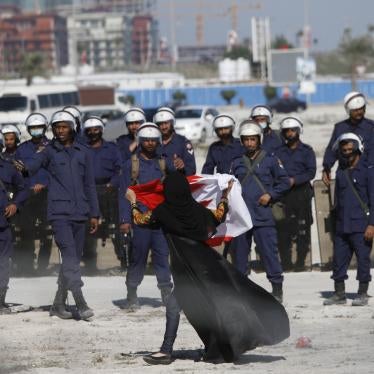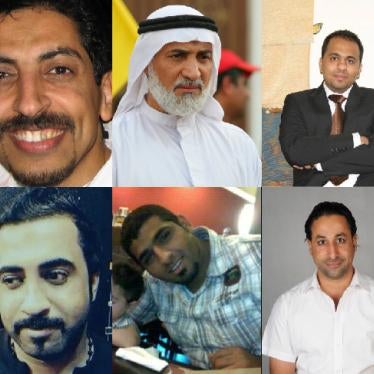(Beirut) – Serbia extradited a Bahraini political dissident to Bahrain in the early hours of January 24, 2022, despite an order by the European Court of Human Rights that specifically prohibited his extradition pending more information, Human Rights Watch said today. Bahraini authorities had previously subjected the dissident, Ahmed Jaffer Muhammad, 48, to torture and ill-treatment.
Muhammad fled the country in 2013. Bahraini courts subsequently sentenced him to life in prison in absentia at least twice following apparently unfair trials. In 2015, Bahraini authorities stripped him of his citizenship, leaving him stateless. Serbia initiated extradition proceedings after Interpol, the international police body, issued a Red Notice alert at Bahrain’s request.
“Interpol and Serbian authorities have put a man who fled torture and life in a Bahraini prison and sought refuge in Europe at grave risk,” said Joe Stork, deputy Middle East director at Human Rights Watch. “It is terrifying and inexcusable that Serbia and Interpol collaborated to return a dissident to face life in prison despite the European Court of Human Rights order halting his extradition.”
Human Rights Watch had documented that Bahraini authorities tortured Muhammad while interrogating him following his arrest alongside other protesters in 2007 after participating in a series of demonstrations in response to alleged abuses by security forces. He was subsequently sentenced to prison for offenses that included illegal assembly and illegal possession of weapons. He was freed along with other political prisoners in 2009 under a royal pardon.
Serbian authorities arrested Muhammad on November 3, 2021, on the basis of an Interpol Red Notice – an alert seeking the arrest and extradition of a wanted person – issued at Bahrain’s request in 2015. It is unclear when Muhammad had arrived in Serbia but his lawyer, Marko Štambuk, a lawyer who collaborates with the Belgrade Centre for Human Rights on asylum cases, told Human Rights Watch that Muhammad was intending to seek asylum somewhere in Europe.
Interpol, now headed by Nasser al-Raisi, a top UAE Interior Ministry official, has long ignored criticism by international human rights groups, including Human Rights Watch, of the abusive use by countries, including the UAE, of its Red Notice system.
Four times during his detention in a Serbian jail, Muhammad wrote to the Higher Court in Belgrade stating his intention to seek asylum in Serbia, Štambuk told Human Rights Watch.
On December 7, however, the High Court accepted the extradition decision. The appeals court then rejected Muhammad’s appeal on that decision on January 18. The decision was then sent to Serbia’s Minister of Justice, Maja Popovic, who approved the decision, clearing the way for Serbia to forcibly return him to Bahrain within days. Štambuk said that he informed Serbia’s competent asylum authorities, the asylum office at the Ministry of Interior, and the Border Police Directorate, on January 20 of Muhammed’s intention to seek asylum and that they responded the next day, January 21, stating that he would be allowed to do so.
On that same day, the European Court of Human Rights (ECHR) issued an interim measure calling on Serbia to halt Muhammed’s extradition pending more information, including “the possible risks of torture and/or ill-treatment that the applicant would face if extradited to Bahrain.” The court also asked whether he would be entitled “to have his life sentence reviewed in Bahrain” and instructed Serbia to seek the information from Bahrain by February 11. The court said that Serbia should not extradite Muhammad before February 25, 2022.
Despite being made aware of the court’s decision, Serbian authorities carried out the extradition request in the early hours of January 24, the Belgrade Centre for Human Rights reported, transferring Muhammad to Bahraini officials’ custody at Belgrade’s international airport.
The Bahrain Institute for Rights and Democracy, which found details of the non-scheduled flight online, reported that Muhammed was flown to Bahrain on a plane owned by UAE-based Royal Jet, a private airline chaired by Sheikh Mohammed bin Hamad bin Tahnoon Al-Nahyan, a member of Abu Dhabi’s ruling family.
In October 2013, after Muhammed had fled Bahrain, a Bahraini court sentenced him and eight other defendants to life in prison on terrorism-related charges. Muhammad and four others were sentenced in absentia. According to local media reports at the time, all four defendants who were present for trial told the court that their confessions were extracted under torture but the court ignored their accounts.
In February 2015, Muhammad was again sentenced to life in prison and stripped of his Bahraini citizenship on charges of involvement from afar in a militant group accused of carrying out a bombing in 2014 that killed two Bahraini police officers and an officer from the United Arab Emirates. Six other defendants in the case were given life sentences, and three were sentenced to death despite alleging torture and subsequently executed on January 13, 2017. The UN Office of the High Commissioner for Human Rights said it was “appalled” by the executions. The court revoked the citizenship of seven other defendants.
In its announcement of Muhammad’s forcible return to Bahrain on January 24, the Bahraini Interior Ministry made reference to two other convictions issued in absentia against Muhammad between 2012 and 2015, another life sentence and a 10-year sentence for terrorism-related offenses. Human Rights Watch has not been able to obtain any further information about these cases.
An interview with Muhammad is included in a 2010 Human Rights Watch report about the use of torture in Bahrain. In it, Muhammad said he was suspended by his interrogators for prolonged periods, possibly from a pipe, by his handcuffed hands and beaten and kicked. He said he was later suspended in the same way a second time after he denied possessing a rifle.
Bahrain should release or retry Muhammad before a court that observes international fair trial standards, Human Rights Watch said.
Human Rights Watch has documented rampant fair trial abuses in Bahraini courts dealing with cases of dissidents and critics and the failure of Bahraini authorities to investigate torture complaints and hold those responsible accountable. Since 2011 Bahrain has stripped hundreds of Bahrainis of their citizenship, in many cases leaving them stateless.
Serbia’s deportation of Muhammad violates the international law principle of nonrefoulement, which obliges states not to return anyone to places where they would face a real risk of torture or cruel, inhuman, or degrading treatment. It also violates Serbia’s obligations under the UN Convention Against Torture and the International Covenant on Civil and Political Rights. Serbia is a state party to both. The ECtHR has asked the Serbian government to explain by January 27 why it extradited Muhammad in contravention of the court’s earlier order.
“Serbia’s haste to extradite Ahmed Muhammad was simply unconscionable in light of the European human rights court injunction,” Stork said. “This deplorable extradition underscores the need for Interpol to seriously reform its Red Notice system, which is open to abuse.”









